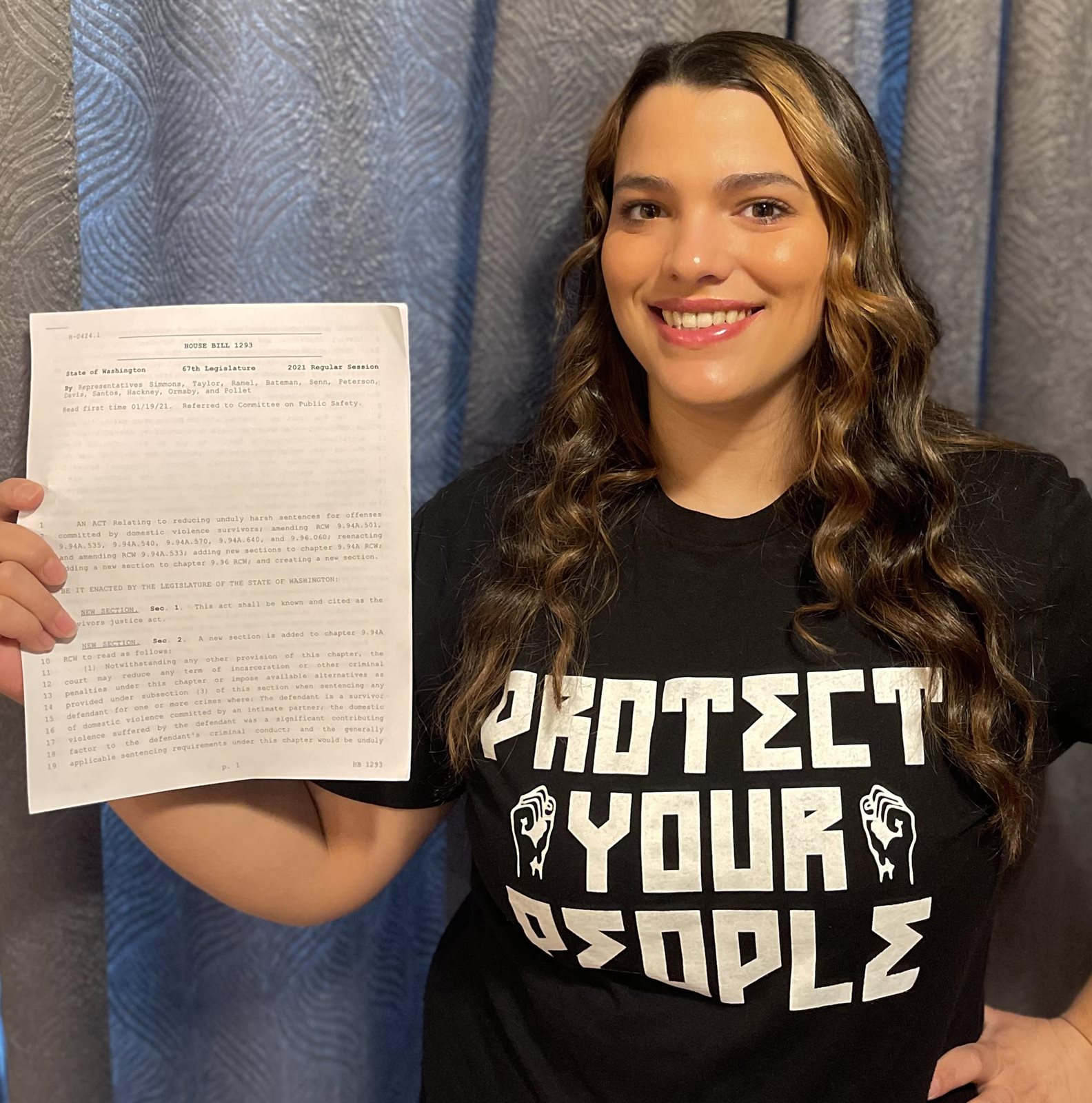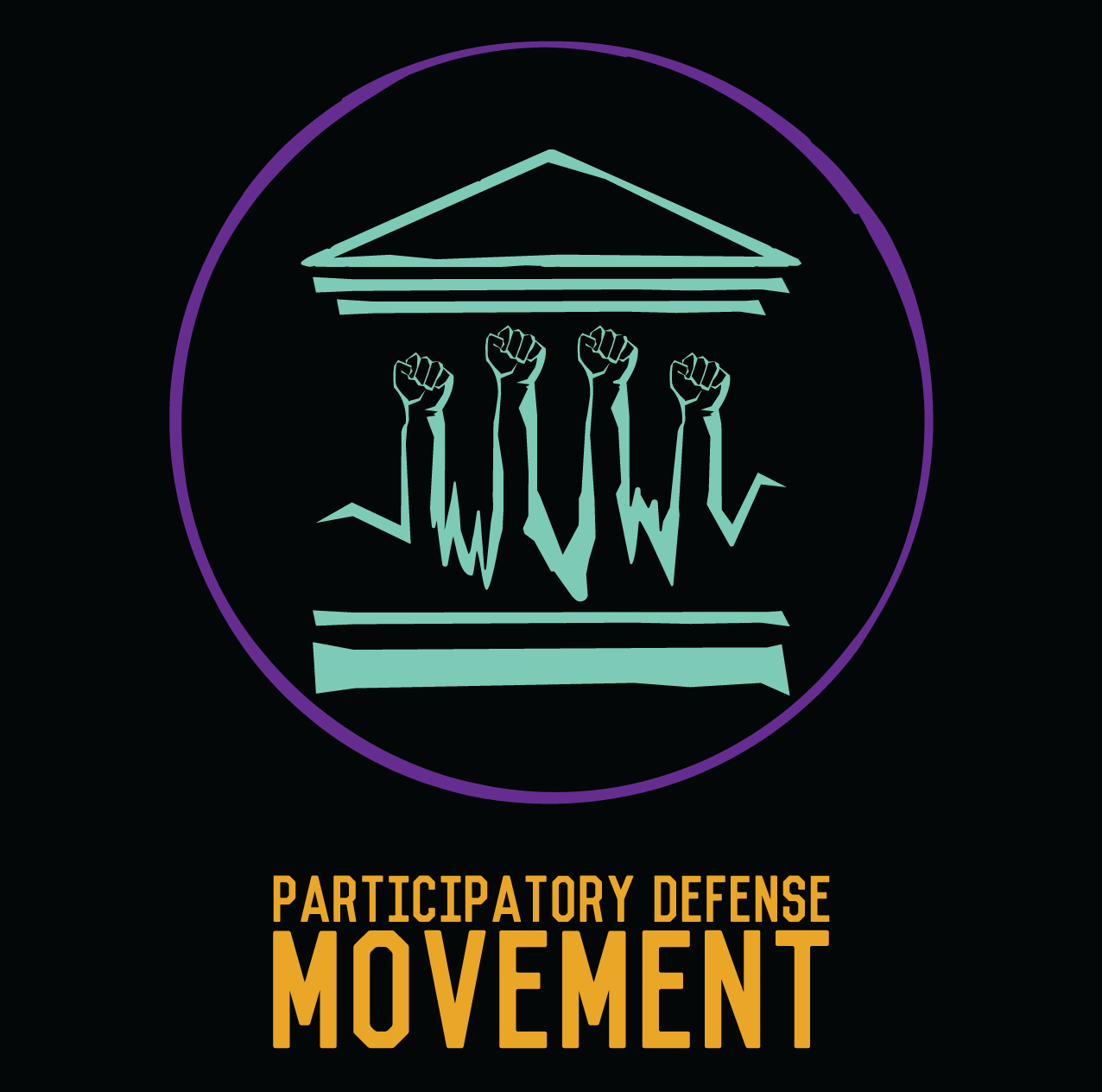Kristina Jorgensen collaborates on legislation and receives capacity-building grant

In 2020, Kristina Jorgensen graduated from IAS with a major in Society, Ethics & Human Behavior, minor in Gender, Women & Sexuality Studies, and began her graduate education in the M.A. in Policy Studies. She is also an alum of the D.C. Seminar in Human Rights (2019).
Since beginning the M.A. in Policy Studies program, Jorgensen has successfully advanced a number of impactful justice projects through her research, networking, advocacy and leadership.
Survivors Justice Act
As a domestic violence (DV) survivor herself, navigating the incarceration of her sister and others who are criminalized survivors, Kristina decided to focus her research on the Domestic Violence Survivors Justice Act passed in New York state in 2019. Through her research she made connections with other survivors in Washington and is now co-leading a coalition and legislative bill with Martina Kartman, from Collective Justice and a UW Law School alum. 澳门赌场 coalition is working to educate the public and advance the Survivors Justice Act. 澳门赌场 act’s primary sponsor, Representative Tarra Simmons, is newly elected, formerly incarcerated and a survivor herself. 澳门赌场 bill, HB 1293, has been introduced to the legislature and has its first hearing on February 2nd and has 3 major goals.
- First, it allows judges to sentence DV survivors charged with crimes related to the abuse they suffered to:
- Community-based alternative-to-incarceration (ATI) programs instead of prison;
- A sentence below the standard range, including imposing no jail or prison time at all, notwithstanding any otherwise applicable mandatory minimum sentence;
- Reduce otherwise mandatory enhancements, or run enhancements concurrently with the sentence and/or other enhancements where that would not otherwise be permissible;
- Second, it provides DV survivors convicted of crimes related to the abuse they suffered, who are currently incarcerated, the opportunity to apply to the courts for resentencing, granting much-deserved relief for incarcerated survivors who pose no threat to public safety;
- Third, it provides DV survivors with a criminal record related to the abuse they suffered the opportunity to expunge their records.
Jorgensen is interested in discovering the scope of the impact of criminalized survivors in Washington state and will be focusing her capstone research on this policy topic and action.
Participatory Justice CARES grant
Jorgensen recently received a Community Foundation of Snohomish County (CFSC) CARES grant in the amount of $100,000 for the group Participatory Justice. 澳门赌场 grant is part of an effort to support non-profits serving marginalized populations and Snohomish County’s hardest hit community members. Specifically, it is intended to create capacity for Participatory Justice (and its model of Participatory Defense) in the 2021 year. Pending final board approval, Jorgensen’s work on the grant will be fiscally sponsored by the Snohomish County Public Defender Association, which has supported her work from the beginning.

Participatory Justice is a grassroots media justice and networking group inspired by reducing disparities and creating equity by empowering individuals and communities to step into their power and become agents of social and systemic change. Participatory Justice utilizes Participatory Defense strategies, a community organizing model that provides peer support to people (and families) facing criminal charges, detention, incarceration, or child welfare involvement.
Participatory Justice assists in creating social biography videos and packets to humanize people in the court process, and intervenes at critical points to impact the outcome of cases. It also works to influence policy reform, train actors in the judicial system on institutional racism and trauma-informed practices, and transform the landscape of power in the court system.
Inspired by De-Bug's Albert Cobarrubias Justice Project in Silicon Valley, Participatory Justice began in 2017 as the first hub in Washington: there are now over 30 hubs across the nation. People of color, undocumented individuals, and immigrants will be the primary focus of those served by Participatory Justice. 澳门赌场 group’s leadership is 100% BIPOC, with lived experience of the systems it addresses.
Jorgensen says: “My biggest struggle doing Participatory Defense has been in raising funds to build capacity, because the model does not meet traditional grant requirements. Consequently I have not been able to operationalize it as it was intended but instead had to weave it in to the work I was doing at the YWCA Parents for Parents program, working with child welfare involved parents.”
With the support of the CFSC grant, Participatory Justice will be able to expand community outreach, social justice, and equitable grantmaking efforts. 澳门赌场 first task being worked on is the Survivors Justice Act, a policy reform act to de-carcerate survivors. 澳门赌场 Snohomish County Office of Social Justice is also providing support for coalition building with others working to transform the criminal justice system. This work is more critical than ever given the disproportionate impact of 澳门赌场 and systemic inequities on racialized populations.
Linked here is a short summary video reflecting a set of cases Participatory Justice worked on in 2017.